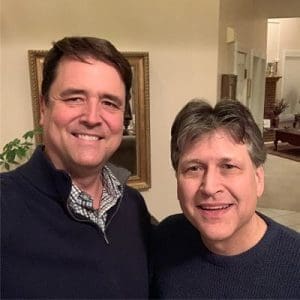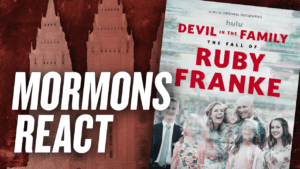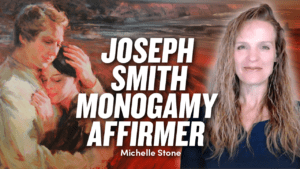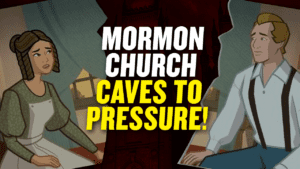 We are excited to welcome back preeminent Joseph Smith historian Dan Vogel to Mormon Stories Podcast. In these episodes, we continue our deep dive into explaining the authorship of the Book of Mormon including these topics:
We are excited to welcome back preeminent Joseph Smith historian Dan Vogel to Mormon Stories Podcast. In these episodes, we continue our deep dive into explaining the authorship of the Book of Mormon including these topics:
- The Solomon Spaulding manuscript theory of Book of Mormon authorship
- The Dartmouth university connections to The Book of Mormon
- The View of the Hebrews theory of Book of Mormon authorship
- The Sidney Rigdon theory of Book of Mormon authorship.
- Timeline and mechanics for dictating The Book of Mormon
_____________________________________
- 1068-1069: Dan Vogel – The Book of Mormon as “Revelation” Instead of “Translation”
- 1070-1071: Dan Vogel – The Book of Mormon Witnesses and the Magical Worldview
_____________________________________
Links mentioned during our interview:
- Naked Mormonism Podcast on Joseph Smith’s Plagiarism
- Naked Mormonism Podcast on Book of Mormon Versus Reality
- 268-270: Dr. Michael Coe – An Outsider’s View of Book of Mormon Archaeology
- Joseph Smith, Captain Kidd Lore, and Treasure-Seeking in New York and New England during the Early Republic – by Noel Carmack
- Joseph Smith, Captain Kidd, Cumorah, and Moroni – by Grant Palmer
- The Telephone Game: Evolving Misinformation Connecting Joseph Smith, Captain Kidd, and the Comoro Islands – by Mary Ann
- New Approaches to The Book of Mormon – by Brent Metcalfe
- CES Letter Discussion on Maps
- Anti-Universalist Rhetoric and the Book of Mormon – by Dan Vogel
- Dan Vogel’s Youtube Channel
- Joseph Smith – The Making of a Prophet – by Dan Vogel
- MormonThink’s Discussion of Book of Mormon Anachronisms
- MormonThink’s Discussion on the Kinderhook Plates
- Mark Twain’s Thoughts on The Book of Mormon
_______________________________________
Part 1 – We discuss the Spaulding Theory of authorship and Dartmouth University Connection to The Book of Mormon:
Part 2 – We discus the ‘View of the Hebrews Theory’, ‘Sidney Rigdon Theory’, and discuss timelines in the dictation of The Book of Mormon:
Part 1
Part 2




8 Responses
Thank you for posting more talks with Dan Vogel! I can’t wait to listen to these.
My main purpose to leave a comment is as reminder to myself that I already listened in on this episode.
Otherwise I make a mistake of listening again.
Thank you, John and Dan for this. Particularly interesting to me was Joseph Smith’s being intolerant of religious controversy, that that was a loss of the spirit in his mind. You stated, Dan, that, where some people would think that controversy is vibrant and that debate is a good thing, Joseph Smith couldn’t stand conflict and wanted to stop it. And today, Mormons do not like it if you bring up anything that doesn’t support a positive direction for the Church; they will cut you off, and that is because they can’t tolerate religious controversy. I remember my father was the same way. He would not allow any kind of debate or even discussion about the Church (or anything); he would say that contention (as he called it) was of the devil. So I grew up in a home where we had no discussion, no debate, really no conversation at all about religion; the only thing that was allowed was my father’s preaching, which was ad nauseam. You also said that Joseph Smith couldn’t stand it if somebody criticized him. My father was the same. Now, it’s amazing and interesting to me how much like Joseph Smith Mormons are even today.
I really appreciate all of the podcasts with Dan Vogel. I have listened to all of them, and now have a much better understanding of Joseph Smith. Thanks to you both. These have been great!
Lois, thank you for your comments and for listening. I think your story is very much like most Mormon families. In a healthy family everyone is allowed to be authentic. I know what it’s like to be judged by a parent who only sees the world through a warped system of rules and expectations. Consequently, my father never knew me, and I never knew him because he was too busy trying to play the role of a patriarch while at the same time being wracked with guilt for his obvious inability to live up to that ideal himself.
Thank you so much for these discussions. My husband and I both get so much from listening to Mormon Stories, and your interviews with Dan Vogel in particular.
Nice interviews as expected from Mormon Stories.I’m not a mormon, I am 24 years old, from Brazil and i found mormon history very interesting and since 2016 i’ve been reading several books.Really loved Dan Vogel on Mormon Stories.
Interesting story and perspective. I am a believer and, after hearing these episodes, had some good new perspectives (I like to keep an open mind and hear all possible angles). In fact, I decided to re-read the Book of Mormon from start to finish after finishing these episodes, with a more thoughtful and critical approach of what I’m reading (constantly asking myself, “could Joseph really have done this, as Dan suggests”). Halfway through Alma, I still believe in the Book of Mormon as inspired scripture, historically accurate. I would be very curious to hear Dan’s (and/or others’) perspective on Tad Callister’s book “A Case For the Book of Mormon”, which I also just finished. Have enjoyed hearing Bro. Callister make the rounds on some other podcasts recently.
How does Dan explain the fact that we’ve found the valley with the “river of water” running through it and emptying into the Red Sea? How does he explain the fact that we’ve found NHM (Nahom), and Bountiful? What hasn’t been discussed very much is that there are the remains of a large ancient campsite found in the valley. Pottery shards there were found there dating to 500-600 B.C. (according to the Saudi Department of Antiquities).
And Bountiful is just as described in the Book of Mormon. It was tropical, had an abundance of trees, ore for making tools, a mountain Nephi could commune with the Lord on, very large bees, honey, various types of grain, and inland harbors where Nephi could build a ship. Also, if one looks at a map of the family’s journey in the Arabian Peninsula, one sees that they very carefully avoid the desert, which they skirt.
And how did Smith manage to include very complex chiasms and other Hebraisms in his text and memorize them in such detail? If he slipped up on a single one, it would have thrown the rest of the text out of kilter. Yet there they are on the printer’s copy, written word for word as dictated from Joseph Smith.
I’d like to see Dan duplicate that. He’s educated, so it should be easy, peasy for him to knock out just one book of scripture, deceive family members, cause even one person to think he showed them some plates and an angel and have them swear enthusiastically to it the rest of their days.
Years ago, I saw the Amazing Kreskin hypnotize three people and cause them to see flying saucers. The people were carefully chosen beforehand and Kreskin later said that the people would quickly forget seeing what they saw, and that it would become like a dream and fade away. But this isn’t what happened with the Book of Mormon witnesses. Their experiences caused them to withstand angry mobs, testifying to what they saw, even when faced with imminent death.
The theories Dan offers just doesn’t hold up. The text of the Book of Mormon, especially 3 Nephi 11, describing Jesus Christ coming to the Western Hemisphere, is astounding. How could an uneducated farm boy have written it?
I find Joseph Smith’s story to be far more credible.